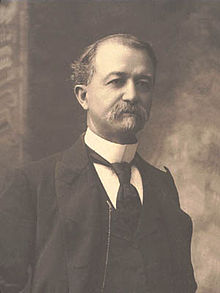
Back ميرفي جيه. فوستر Arabic ميرفى جيه. فوستر ARZ مورفی جی. فاستر AZB Murphy J. Foster German مورفی جی. فاستر Persian Murphy J. Foster French Murphy J. Foster Hungarian Murphy Iacobus Foster Latin Murphy J. Foster Polish Фостер, Мёрфи Джеймс Russian
Murphy J. Foster | |
|---|---|
 | |
| United States Senator from Louisiana | |
| In office March 4, 1901 – March 3, 1913 | |
| Preceded by | Donelson Caffery |
| Succeeded by | Joseph E. Ransdell |
| 31st Governor of Louisiana | |
| In office May 10, 1892 – May 8, 1900 | |
| Lieutenant | |
| Preceded by | Francis T. Nicholls |
| Succeeded by | William Wright Heard |
| Member of the Louisiana State Senate from the 10th district | |
| In office 1880–1892 | |
| Personal details | |
| Born | Murphy James Foster January 12, 1849 Franklin, Louisiana |
| Died | June 12, 1921 (aged 72) Franklin, Louisiana |
| Political party | Democratic |
| Spouses | Florence Daisy Hine Foster
(m. 1877; died 1877)Rose Routh Ker Foster
(m. 1881) |
| Children | 10 |
| Parent(s) | Thomas J. and Martha P. Murphy Foster |
| Relatives | Mike Foster (grandson) |
| Alma mater | |
| Signature |  |
Murphy James Foster (January 12, 1849 – June 12, 1921) was the 31st Governor of the U.S. state of Louisiana, an office he held for two terms from 1892 to 1900.[1] Foster supported the Louisiana Constitution of 1898, which effectively disfranchised the black majority, who were mostly Republicans. This led to Louisiana becoming a one-party Democratic state for several generations and excluding African Americans from the political system.
Louisiana followed Mississippi (1890) and other southern states in adopting a new constitution with devices to disfranchise blacks, then a majority in the state, chiefly by making voter registration more difficult. This situation of discriminatory political exclusion was not corrected until after enforcement of constitutional rights by the federal government under the Voting Rights Act of 1965.
- ^ Louisiana Department of Culture, Recreation and Tourism. "Murphy James Foster Historical Marker".